What is the difference between Baptist and Catholic Beliefs?
Let’s compare Catholics vs Baptists! What’s the difference between the two? Are they both Christian? Let’s find out. Catholics and Baptists share some core distinctives, but also hold widely diverse beliefs and practices. Let’s contrast and compare the Roman Catholic Church and Baptist theology.
Similarities between Catholics and Baptists
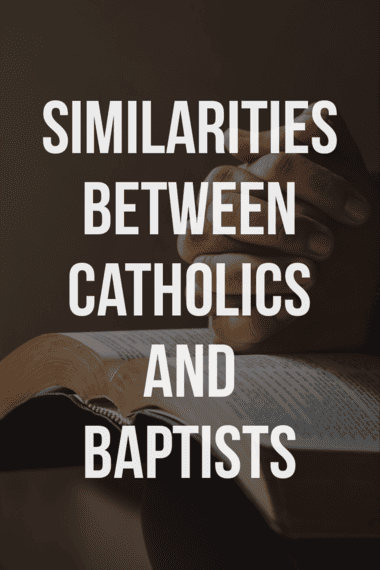
Both Catholics and Baptists believe God created the world and heaven and hell. Both believe in the Fall of man from Adam’s sin, for which death is the punishment. Both believe all people are born in sin. Both believe Jesus was born of a virgin, lived a sinless life, and died for our sins and was resurrected so we can be redeemed.
Both Catholics and Baptists believe Jesus will return from heaven in the Second Coming, that all the dead will rise again. Both believe in the Trinity – that God exists in the form of Father, Son, and the Holy Spirit and that the Holy Spirit indwells and guides believers.
What is a Catholic?
Brief history of the Catholic Church
Catholics say their history goes back to Jesus’ disciples. They say Peter was the first bishop of Rome, succeeded by Linus as Bishop of Rome in AD 67, who was succeeded by Clement in AD 88. Catholics believe that the line of leadership followed Peter, Linus, and Clement up to the present-day Pope in Rome. This is known as the apostolic line of succession.
In 325 AD, the Council of Nicaea, among other things, attempted to structure church leadership around the model Rome used in its world empire. When Christianity became the official religion of the Roman Empire in AD 380, the word “Roman Catholic” began to be used to describe the worldwide church, with Rome as its leader.
Some Catholic distinctives
- The worldwide church is ruled by local bishops who have the pope as their head. (“Catholic” comes from the Greek word meaning “universal”).
- Catholics go to their priest to confess sins and receive “absolution.” The priest will often assign a “penance” to help internalize repentance and forgiveness – such as saying a certain prayer, like repeating the “Hail Mary” prayer or doing kind acts for someone they sinned against.
- Catholics venerate the saints (those who led lives of heroic virtue and through whom miracles occurred) and Mary, mother of Jesus. In theory, they don’t pray to these deceased people, but through them to God – as mediators. Mary is considered the mother of the church and queen of heaven.
What is a Baptist?
Brief history of baptists
In 1517, the Catholic monk Martin Luther posted his 95 Theses criticizing some Roman Catholic practices and teachings. He believed the pope could not forgive sins, that salvation came by faith alone (instead of faith and works, as taught by Catholics), and that the Bible was the only authority for belief. Luther’s teachings led to many people leaving the Roman Catholic church to form several Protestant denominations.
In the mid 1600’s, some Protestant Christians, who became known as Baptists, challenged beliefs such as infant baptism. They believed one should be old enough to have faith in Jesus before baptism, which should be performed by fully going underwater. They also believed each local church should be independent and govern themselves.
Some Baptist distinctives
- Each church is autonomous, with no hierarchy of authority over local churches and regions.
- Baptists believe in the priesthood of the believer, confessing sins directly to God (although they can also confess sins to other Christians or to their pastor), without needing a human mediator to extend forgiveness.
- Baptists honor Mary and important Christian leaders throughout history, but they don’t pray to (or through) them. Baptists believe Jesus is their only mediator (“For there is one God, and one mediator between God and men, the man Christ Jesus” 1 Timothy 2:5).
- Baptists believe the government shouldn’t dictate church practices or worship, and the church should not attempt to control government (except through praying for and voting for political leaders).
View of salvation between Catholics and Baptists
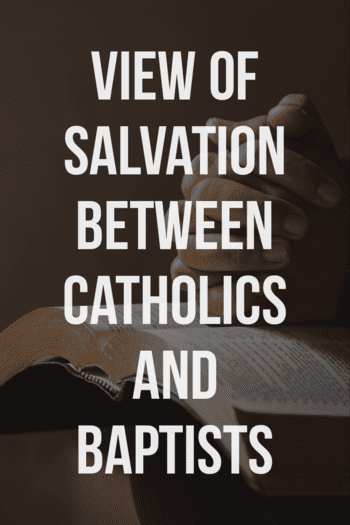
Catholics view of salvation
Historically, Catholics believe salvation is a process that begins by baptism and continues by cooperating with grace through faith, good works, and participating in the sacraments of the Church. They don’t believe we are fully righteous in the sight of God at the moment of salvation.
Recently, some Catholics have shifted their doctrine regarding salvation. Two prominent Catholic theologians, Father R. J. Neuhaus and Michael Novak, collaborated with Protestants in 1998 to make a “Gift of Salvation” statement, where they affirmed justification by faith alone.
Baptists view of salvation
Baptists believe salvation comes only through faith in Jesus’ death and resurrection for our sins. (“Believe in the Lord Jesus, and you will be saved” Acts 16:31)
To be saved, you must realize you are a sinner, repent of your sins, believe that Jesus died and rose again for your sins, and receive Jesus as your Savior. (“If you confess with your mouth, ‘Jesus is Lord,’ and believe in your heart that God raised Him from the dead, you will be saved. For with your heart you believe and are justified, and with your mouth you confess and are saved.” Romans 10:9-10)
Salvation comes in that instant of faith – it is not a process (although one makes progress toward moral and spiritual maturity through the indwelling Holy Spirit).
Purgatory views in the Baptist and Catholic Church
Catholics believe you must not have any unconfessed sin when you die. That’s almost impossible to do since you may not have time to confess to a priest before dying or may have forgotten some sins. Therefore, purgatory is a place of purification and punishment for unconfessed sin, to achieve the holiness needed to enter heaven.
Do Baptists believe in purgatory?
Baptists believe that all sins are forgiven once a person is saved. Baptists believe that a saved person is immediately ushered into heaven when they die, thus they don’t believe in purgatory.
Views on faith and works
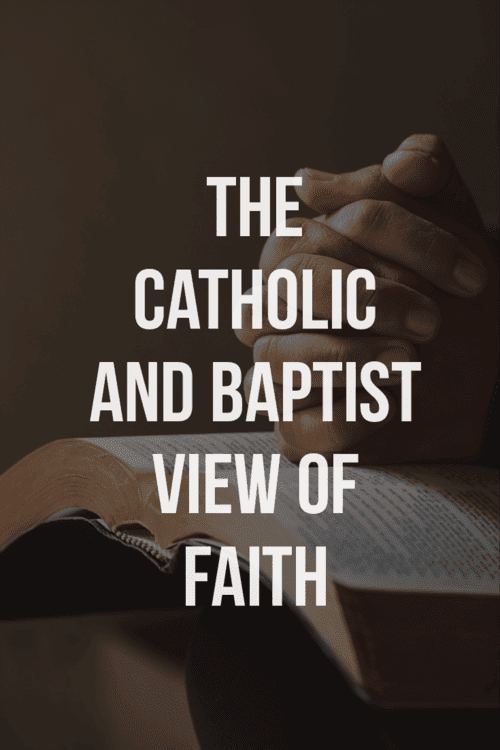
The Catholic church teaches that “faith without works is dead” (James 2:26), because good works perfect faith (James 2:22). They believe baptism begins the Christian life, and as the person receives the sacraments, that his or her faith is perfected or matured and the person becomes more righteous.
The 1563 Council of Trent, which Catholics hold as infallible, says, “If any one saith, that the sacraments of the New Law are not necessary unto salvation, but superfluous; and that, without them, or without the desire thereof, men obtain of God, through faith alone, the grace of justification; though all (the sacraments) are not indeed necessary for every individual; let him be anathema (excommunicated).”
Baptists believe that we are saved by faith alone, but good works are an outward expression of the spiritual life. Only faith saves, but good works are the natural consequence of salvation and walking in the Spirit.
Sacraments
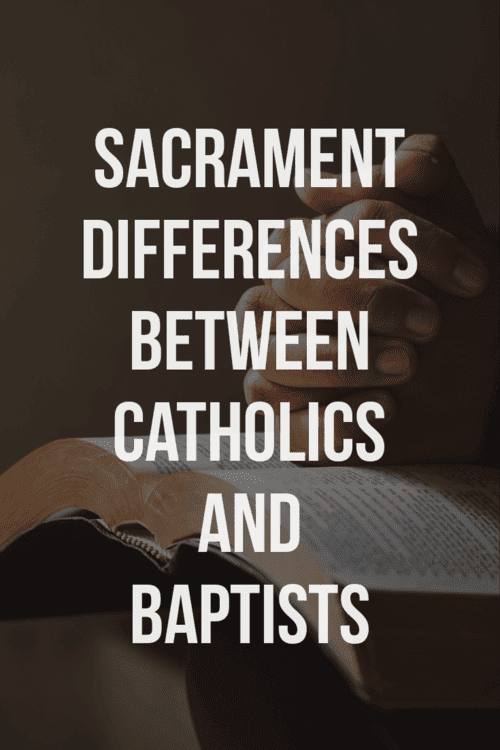
Catholic sacraments
For Catholics, sacraments are religious rites that are signs and channels of God’s grace to those who receive them. The Catholic church has seven sacraments.
Sacraments of initiation into the church:
- Baptism: usually babies, but older children and adults are also baptized. Baptism is necessary for salvation: it initiates into the Catholic church and is done by pouring water three times over the head. Catholics believe baptism purifies, justifies, and sanctifies the sinner, and the Holy Spirit indwells a person at their baptism.
- Confirmation: around seven years old, Catholic children are “confirmed” to complete the process of initiation into the church. Children go through classes to prepare them and attend their “first reconciliation” (first confession). At confirmation, the priest anoints the forehead with sacred oil, and says, “Be sealed with the gift of the Holy Spirit.”
- Eucharist (Holy Communion): Catholics believe the bread and wine are transformed in their inner reality into the body and blood of Christ (transubstantiation). Holy Communion brings God’s sanctification to the faithful. Catholics are expected to take Holy Communion at least once a week.
Sacraments of healing:
- Penance (or Reconciliation) includes 1) contrition or remorse for sins, 2) confessions of sins to a priest, 3) absolution (forgiveness), and penance (rote prayers or certain actions like returning stolen goods).
- Anointing of the Sick used to only be given to people just before they died (Last Rites or Extreme Unction). Now those in danger of death from serious illness, injury, or old age can receive anointing with oil and prayer for recovery.
Sacraments of service (not required for all believers)
- Holy Orders ordains a layperson as a deacon,* a deacon as a priest, and a priest as a bishop. Only a bishop can perform Holy Orders.
*For Catholics, a deacon is like an Assistant Pastor, who may be a celibate man in training for the priesthood or a married man with a calling to serve the church (the latter is known as a “permanent” deacon, since they will not transition to priest).
- Matrimony (Marriage) consecrates the union of a man and woman, sealing them in a permanent bond. Couples must be baptized and committed to attaining holiness together and raising their children in the faith.
Ordinances: Baptists don’t have sacraments, but they have two ordinances, which are acts of obedience to specific commands from God for the entire church. Ordinances symbolize the believer’s union with Christ, helping remember what Jesus did for our salvation.
- Baptism is not given to babies – one must be old enough to have received Christ as their Savior. Baptism involves complete immersion in water – symbolizing Jesus’ death, burial, and resurrection. To be a church member, one must be a baptized believer.
- The Lord’s Supper or Communion remembers the death of Jesus for our sins through eating the bread, representing Jesus’ body, and drinking the grape juice, representing His blood.
The Catholic and Baptist view of the Bible
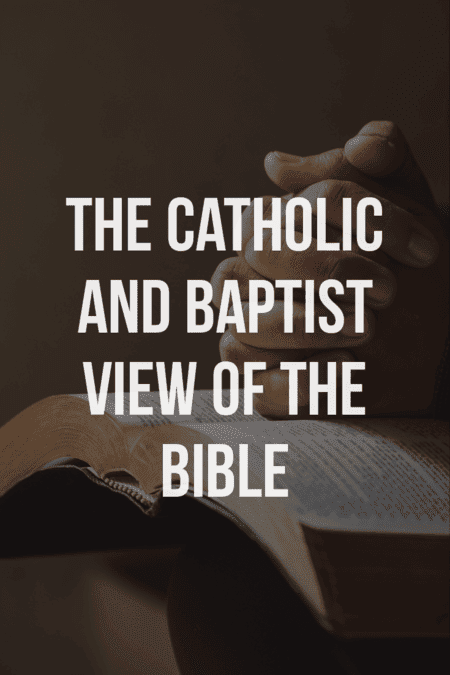
Both Catholics and Baptists believe that the Bible is verbally inspired by God and is infallible.
However, Catholics have three distinct differences from Baptists regarding the Bible:
What’s in the Bible? Catholics have seven books (the Apocrypha) that are not in the Bibles that most Protestants use: 1 and 2 Maccabees, Tobit, Judith, Sirach, Wisdom, and Baruch.
When the reformer Martin Luther translated the Bible into German, he decided to follow the decision of the Jewish Council of Jamnia in AD 90 to not include those books in their canon. Other Protestants followed his lead with the King James Bible and more modern translations.
Is the Bible the only authority? Baptists (and most Protestants) believe only the Bible determines faith and practice.
Catholics base their beliefs on the Bible and traditions and teachings of the church. They feel the Bible alone cannot provide certainty about all revealed truth, and that “Sacred Tradition” handed down by church leaders over the ages must be given equal authority.
Can I read and understand the Bible by myself? In Roman Catholicism, Scripture is interpreted by the bishops in union with the pope. The pope is considered infallible in his teaching. “Lay” (ordinary) believers aren’t expected to be able to interpret and understand the Bible by themselves.
Baptists can study God’s Word, the Bible, on their own and are encouraged to do so daily and follow what it says.
Catechism of the Catholic church
This book explains the 4 Pillars of the Faith: the Apostles Creed, the sacraments, life in Christ (including the 10 commandments), and prayer (including the Lord’s Prayer). Question & Answer sessions in a short simplified version prepare children for confirmation and adults who wish to convert to Catholicism.
Church government
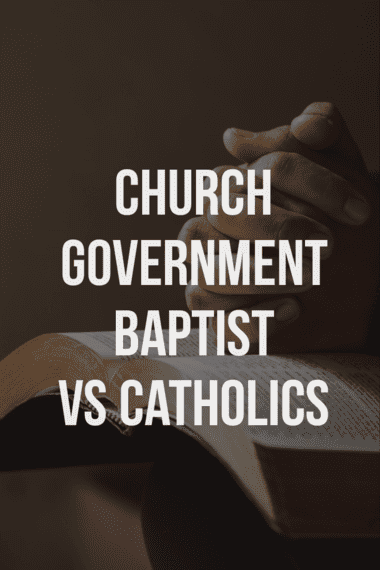
Catholics
Roman Catholics have a hierarchy, with the Pope as the top leader of all Catholic churches in the world. Under him is the college of cardinals, followed by archbishops governing regions around the world. Answering to them are local bishops, who are over the parish priests of the churches in each community (parish). All leaders from priests up to pope must be unmarried and celibate.
Local churches follow the leadership of their priest (or priests) and the bishop of their diocese (area). Each church has “commissions” (like committees) that focus on the church’s life and mission – such as Christian Education, Faith Formation, and Stewardship.
Baptists
Local Baptist churches are independent. They may belong to an association – like the Southern Baptist Convention – but mainly to pool resources for missions and other endeavors. Baptists follow a congregational form of government; national, state, or local conventions/associations have no administrative control over local churches.
Decisions within each local Baptists church are made by the pastor, deacons, and by vote of the people who are members of that church. They own and control their own property.
Pastors
Catholic priests
Only unmarried, celibate men can be ordained as priests. Priests are the pastors of the local churches – they teach, preach, baptize, conduct marriages and funerals, celebrate the Eucharist (communion), hear confessions, administer confirmation and anointing of the sick.
Most priests have a bachelor’s degree, followed by studies at a Catholic seminary. They are then called to Holy Orders and ordained as a deacon by a bishop. Ordination as a priest follows serving in a local parish church as a deacon for 6 months or more.
Baptist pastors
Most Baptist pastors are married. They teach, preach, baptize, conduct marriages and funerals, celebrate communion, pray for and counsel their members, do evangelistic work, and lead the day-to-day affairs of the church. Criteria for pastors are usually based on 1 Timothy 3:1-7 and whatever each church feels is important, which may or may not include a seminary education.
Each local Baptist church selects their own pastors, by vote of the entire congregation. Baptist pastors are usually ordained by the church leadership in the first church they pastor.
Famous pastors or leaders
Well-known Catholic priests and leaders
- Pope Francis, the current Bishop of Rome, is the first from South America (Argentina). He diverged from his predecessors by being open to the LGBT movement and admitting divorced and remarried Catholics to communion. In God and the World to Come, (March 2021), Pope Francis said, “We can heal injustice by building a new world order based on solidarity, studying innovative methods to eradicate bullying, poverty and corruption, all working together.”
- Saint Augustine of Hippo (AD 354-430), a bishop in North Africa, was an important church father who profoundly impacted philosophy and theology for centuries to come. His teachings on salvation and grace influenced Martin Luther and other reformers. His most famous books are Confessions (his testimony) and City of God, which deals with the suffering of the righteous, God’s sovereignty, free will, and sin.
- Mother Theresa of Calcutta (1910-1997) was a nun who earned the Nobel Peace Prize, respected by people of all faiths for her service of charity to the poorest of the poor in India. Founder of Missionaries of Charity, she saw Christ in those who suffer – those in abject poverty, untouchable lepers, or those dying from AIDS.
Well-known Baptist pastors and leaders
- Charles Spurgeon was a “prince of preachers” in the Reformed Baptist tradition in England in the late 1800’s. In the days before microphones, his powerful voice reached audiences of thousands, holding them spell-bound for two-hour sermons – often against hypocrisy, pride, and secret sins, although his overriding message was the cross of Christ (he celebrated the Lord’s Supper every week). He founded the Metropolitan Tabernacle in London, the Stockwell Orphanage, and Spurgeon’s College in London.
- Adrian Rogers (1931-2005) was a conservative Baptist pastor, author, and 3-term president of the Southern Baptist Convention. His last church, Bellevue Baptist in Memphis, grew from 9000 to 29,000 under his leadership. As president of the SBC, he moved the denomination away from a liberal trajectory and back to conservative views such as biblical inerrancy, fathers leading their families, pro-life, and opposition of homosexuality.
- David Jeremiah is a famous author of over 30 books, founder of Turning Point radio and TV ministries, and 40-year pastor of Shadow Mountain Community Church (affiliated with the SBC) in the San Diego area. His books include God in You: Releasing the Power of the Holy Spirit, Slaying the Giants in Your Life, andWhat in the World is Going On?,
Doctrinal positions
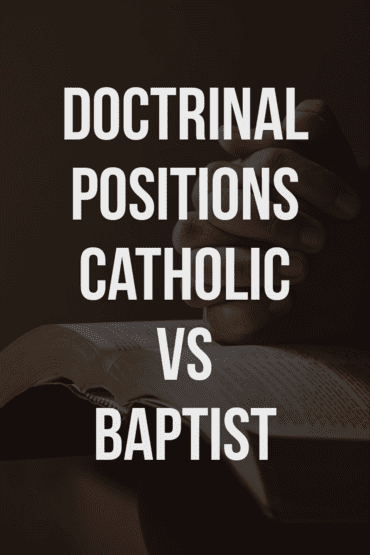
Assurance of Salvation – can you know for sure you are saved?
Catholics don’t have a full confidence that they are saved, because for them salvation is a process that depends on their observing the sacraments after baptism. When they die, no one is completely sure if they’re going to heaven or hell.
Baptists are firm in their belief that if you have faith you are saved because of the inner witness of the Holy Spirit.
Eternal Security – can you lose your salvation?
Catholics believe you can lose your salvation through deliberately and knowingly committing a “mortal sin” if you do not repent and confess it before you die.
Perseverance of the saints – the view that once you are truly saved, you cannot lose your salvation – is held by most Baptists.
Total depravity?
Catholics believe all people (before salvation) are depraved, but not totally. They still believe grace is required for justification, but they point to Romans 2:14-15 that even without the law people “do by nature” what the law requires. If they were totally depraved, they wouldn’t be able to follow the law even partially.
Baptists believe all people are dead in their sins before salvation. (“There is no righteous person, not even one.” Romans 3:10)
Are we predestined for heaven or hell?
Catholics have a range of views on predestination, but believe it is real (Romans 8:29-30). They believe God gives people the freedom to make choices, but because of His omniscience (all-knowing), God knows what people will choose before they do it. Catholics don’t believe in predestination to hell because they believe hell is for those who have committed mortal sins which they didn’t confess before dying.
Most Baptists believe one is predestined for either heaven or hell, but not based on anything we did or didn’t do, other than simply believing.
Conclusion
Catholics and Baptists share many important beliefs on faith and morality and often collaborate with each other in pro-life efforts and other moral issues. However, on several key theological points, they are at odds, especially in beliefs about salvation. The Catholic Church has a wrong understanding of the gospel.
Is it possible for a Catholic to be a Christian? There are many Catholics who hold to salvation by grace through faith in Christ alone. There are even some saved Catholics who are holding to justification by faith alone and struggle to understand the relationship between faith and works. However, it is hard to imagine how a Catholic who holds to the teachings of the RCC can truly be saved. The core of Christianity is salvation by faith alone. Once we deviate from that, it no longer is Christianity anymore.

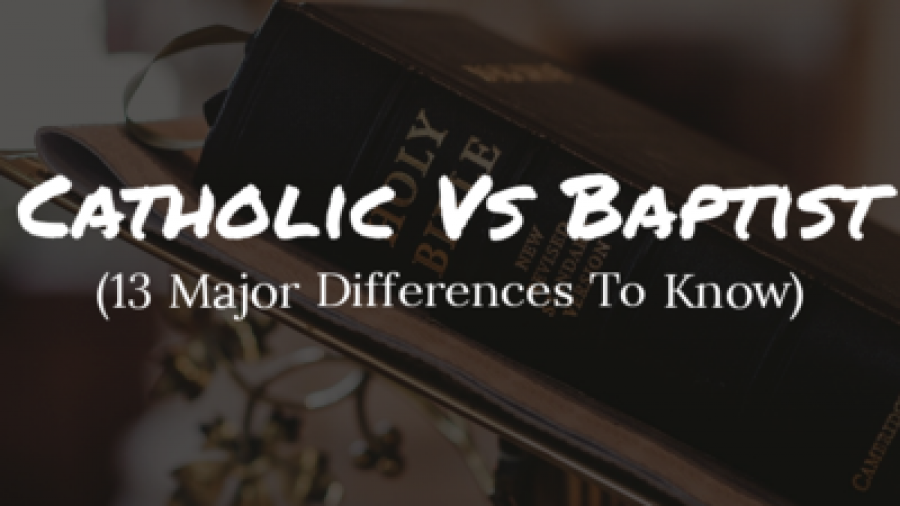
Baptists believe what the Bible says: We are saved by grace through faith (Ephesians 2:8). We must not fail to consider the unmerited favor of God.